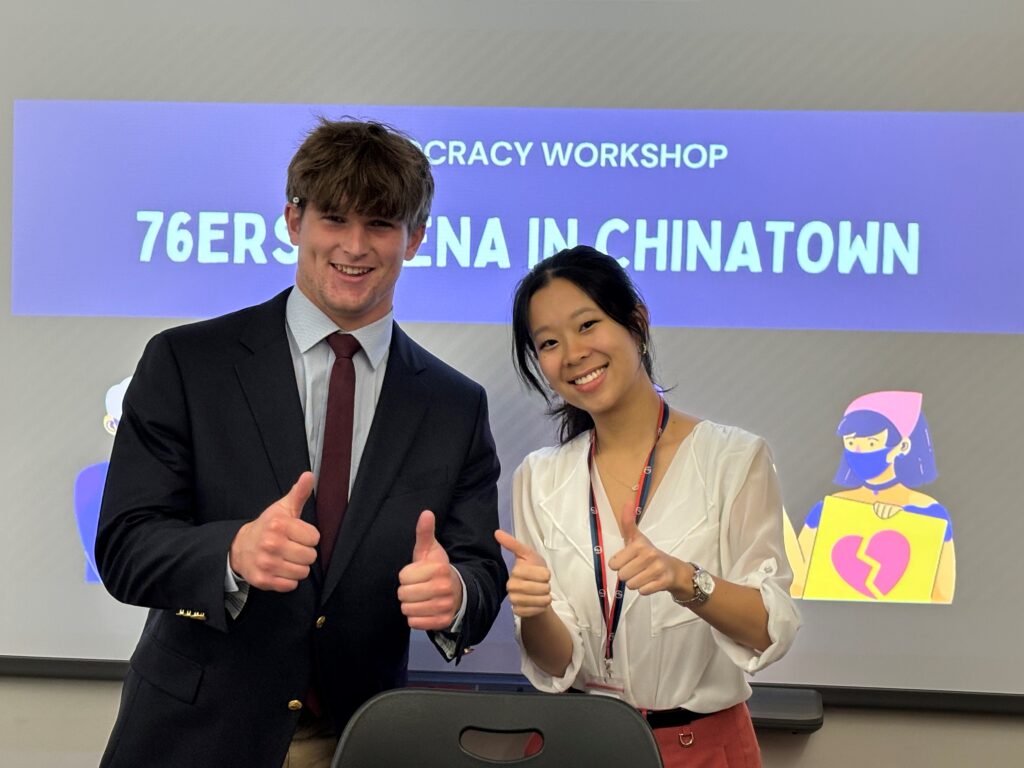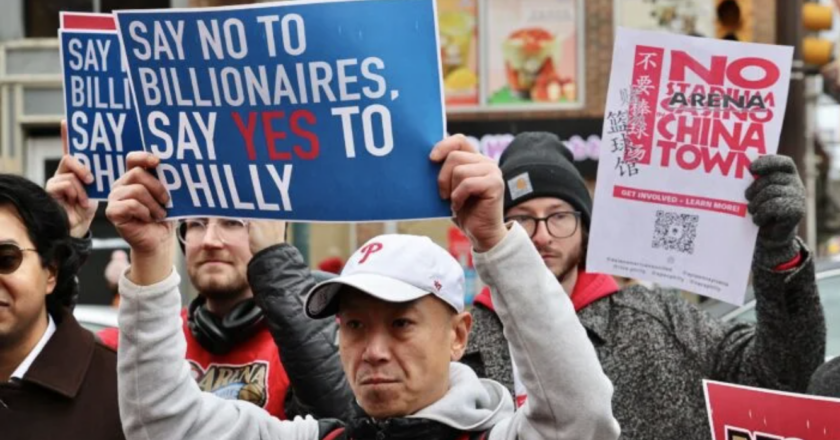On Jan 13, the Philadelphia 76ers basketball team announced a sudden reversal of their plans to build a new arena, called 76 Place, in Philadelphia’s Market East neighborhood, choosing instead to partner with Comcast Spectator to build a new facility in South Philadelphia with the Philadelphia Flyers.
Though the arena had been supported by many members of the Philadelphia City Council, the arena’s two-year planning and development process had been plagued with controversy and pushback from local residents. In particular, Chinatown’s residents actively resisted the arena’s construction, as they would have been directly affected by its construction site only a few blocks away.
Proponents of the arena had argued that it could revitalize the Market East neighborhood and nearby Fashion District by bringing in new businesses and construction jobs, which drew support from groups such as the Black Clergy of Philadelphia. However, a community impact study released by the city found that the arena would likely displace local Chinatown residents and small businesses, decreasing economic gains and contributing to the loss of Chinatown’s unique culture.
The arena’s close proximity to Chinatown had also fuelled concern over the replacement of small, local businesses with corporate ones, which would have devastated many of Chinatown’s families. Other safety concerns, such as high congestion levels impeding emergency vehicles and potentially unsafe encounters between Chinatown residents and delirious sports fans, had also raised alarm.
“When you put a huge arena in a space [like Chinatown] that is filled with hundreds of small local businesses, you’re going to attract large businesses,” Helen Liang ‘25, who ran the “Philadelphia Politics: The Battle over the Proposed Sixers Arena” democracy workshop along with Eddie McGettigan ‘25, said. “A lot of the infrastructure in Chinatown is for restaurants and boutiques that are all Asian-owned. But instead, like, there’s going to be a McDonald’s in Chinatown. That’s insane.”

Additionally, in many ways, the arena’s support among those living outside of Chinatown and other racial groups felt like a profound disregard for Chinatown and the Asian American community that has cherished it as a safe and welcoming space for generations.
“[The arena] was another reason to pit [other communities] against the Asian community,” Mr. Jonathan Na, one of GA’s Asian American Student Association’s (AASA) faculty advisors, said. “You have this group of people who are getting displaced from this 150-year establishment that’s so meaningful for them, whether it’s being new as immigrants trying to find their footing or just having this community. To me, that’s so sad and so frustrating.”
Because of these concerns, Chinatown-based organizations such as the Philadelphia Chinatown Development Corporation and Asian Americans United (AAU) had been protesting and calling for their voices to be heard throughout the arena’s two-year planning process. Countless petitions, fundraisers, and efforts to spread awareness were also organized across the U.S.
Still, as the Philadelphia City Council and Mayor Cherelle Parker voted multiple times to continue the project, resentment and disillusionment have been growing among community members.
“I heard Cherelle Parker give a speech last year to the Asian community about how the Asian and Black communities need to step up and help each other,” Liang said. “And then she goes ahead and votes for the arena to get passed, and she’s very vague about Chinatown and how she’s going to compensate for that. I just think that, she lives in Philadelphia. We live in Philadelphia. We’re neighbors. How could she bulldoze us?”
As a result, the announcement of the arena’s move has been bittersweet for many Chinatown residents and neighbors. While there is certainly relief that this is no longer an immediate threat, many continue to view the entire situation as indicative of wealthy influences over city governance and a disregard for ethnic communities and their spaces.
“When the news broke recently that the Sixers were moving, it raised a couple things that were really upsetting,” Mr. Na said. “At the end of the day, was it better for Chinatown and the community? Yes, for sure. But the fact that [the Philadelphia City Council] voted for [the arena] was huge. I think it was so demoralizing, and it showed how huge corporate businesses, unfortunately, just don’t care about people.”
Many Chinatown residents, fuelled by a growing disillusionment with the city, have chosen to take matters regarding Chinatown and its future development into their own hands. AAU, for example, recently hosted a fundraising event, titled “A Night to Support Philadelphia’s Chinatown,” that brought together six Chinatown chefs to help promote each others’ businesses.
As Chinatown looks towards its future, its residents and surrounding communities will continue to support and fight for its preservation.
Sources:
https://6abc.com/post/philadelphia-chinatown-reassessing-neighborhood-future/15826796
https://whyy.org/articles/philadelphia-sixers-arena-center-city-south-philly/

